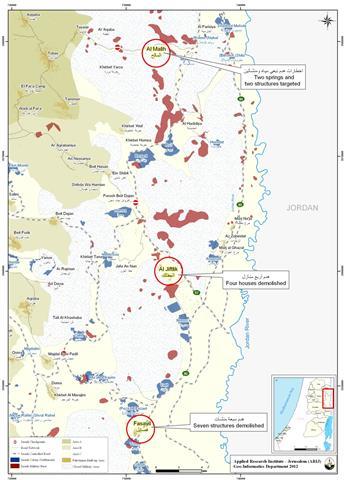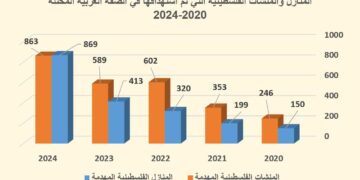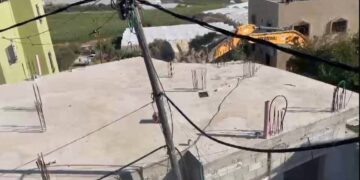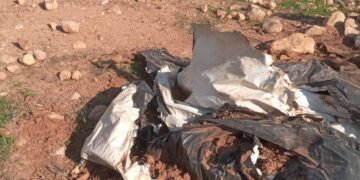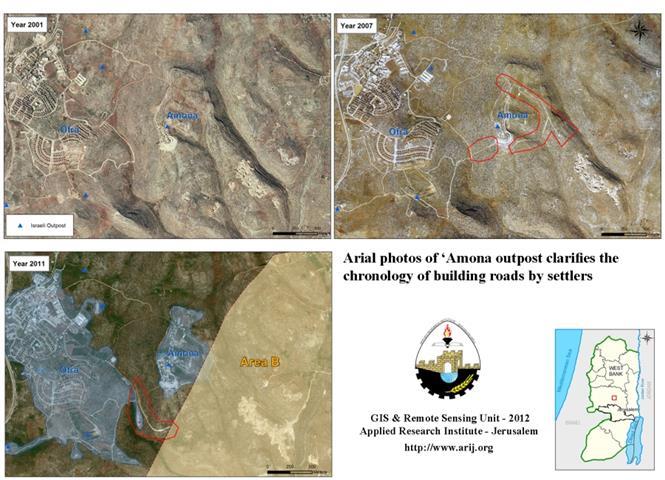The Israeli Occupation army is intensifying its violations and attacks against Palestinians residents all over the occupied Palestinian territory (oPt) with the aim of tightening the grip on them and strangling them to hinder their development on their own lands while moving forward with its colonial plans in favor of the Israeli settlers in the area.
Demolition Operations/Notifications Registered in the Jordan Valley area
On March 12, 2012, officers of the so called “Israeli Civil Administration ICA()” affiliated to the Israeli Occupation Army handed over a Palestinian resident from ‘Ein Al-Hilwa area in Al Malih community in the northern Jordan Valley a demolition notification for his residential brux and animal sheds under the pretext of lacking building permits.
Mr. Sati Zamel, owner of the targeted structures, indicated that the ICA officers handed over his wife the military order which states that he should issue building licenses for his structures by March 29, 2012 otherwise the Israeli Army would demolish them. Moreover, and in the same area (‘Ein Al-Hilwa) in Al-Malih community, the Israeli Occupation Army handed over local residents demolition orders for two springs used by residents for watering the livestock.
Mr. ‘Aref Daraghmeh, head of Al-Malih local council, indicated that the Israeli occupation Army (IOA) notified residents of their intention to demolish the two vital water springs in the area under the pretext of lacking building permits. Mr. Daraghmeh also provided that the two springs are natural springs but local council installed a fence and stones around them to protect them from being polluted, which is a normal procedure; however, the Israeli demolition orders are unjustified and aim to tightening the grip on residents of the area and the Jordan Valley in general in order to push them towards a voluntary migration from their own lands which were inhabited by them on dozens of years ago.
Al Maleh Community, location and population
Al Malih is a Palestinian community located to the east of Tubas city in the northern parts of the West Bank. It is bordered by Bardala community to the north, Khirbet Al-Hadidieyyeh to the south, Al-Faressiyya as well as the Illegal Israeli settlement of Rotem to the east and Al -‘Aqaba and Tayaseer villages to the west.
The boundary of Al-Malih community holds within it seven Bedouin communities, Al-Hadidiya, Khallet Makhoul, Samra, Al-Hilwa, Wadi Al-Malih, and Al-Himma. The whole area has a total population of around 1000 people. The area is classified as ‘Area C’ according to Oslo II Interim Agreement of 1995 and falls under full Israeli control. Furthermore, the area holds a mass number of water springs, which are controlled by the Israeli occupation authorities and Israeli settlers, who prevent Palestinian Communities in the Jordan valley area from benefiting from these springs.
Ten more Structure Demolished in Fasayel & Al-Jiftlik communities
On March 13, 2012, the Israeli Army bulldozers accompanied by the Israeli Army Forces invaded Fasayel Bedouin community in Jericho Governorate and demolished without prior notification, seven structures under the pretext of lacking building permits. The owners of the demolished structures are:
-
‘Abed Yasin Mousa Rashayda. (Two residential tents and one animals’ shelter).
-
Hussein Yasin Mousa Rashayda. (Two residential tents and one animals’ shelter).
-
Khader Yasin Mousa Rashayda. (One animal’s shelter).
Mr. Ibrahim ‘Bayyat, head of Fasayel village council indicated that this wasn’t the first time the Israeli Army bulldozers demolish these structures, where they had been demolished three times before and the last one was iin December 2012.
Fasayel Village, location & population:-
Fasayel, a Palestinian villagelocated in the central Jordan Valley area. It is inhabited by 1,224 citizens (PCBS 2012) and stands on a total built-up area of 194 dunums. The village is bordered by Peza’el senttlement from its north, Tomer, Gilgal, Netiv Hagdud and Niran settlements from its south; the Israeli bypass road 90 from its east and open spaces from its western side.
Israeli Demolitions in Al Jiftlik village:-
On March 14, 2012, another Israeli demolition took place in Al-Jiftlik village in Jericho Governorate as the Israeli Army bulldozers demolished four houses owned by the local residents: Ayman Mit’eb D’eis, Omar Mubarak Youseph Bsharat, Ibrahim Mubarak Youseph Bsharat and Suleiman Tawfiq Daraghmeh and his brother Wadi’.
Mr. Omar Kassab, head of Al-Jiftlik village council clarified that the Israeli Army demolished the four houses last year and this is the second time the houses were demolished under the pretext of lacking building permits. See Map 1
Al Jiftlik village : location & population:-
Al Jiftlik, a Palestinian village located 14 kilometers to the north of Fasayel in the central part of the Jordan Valley. It has a population of 4,216 (PCBS 2012). The village is bordered by the settlement of Argaman from the northeast, Massua’ settlement from the south, Mekhora settlement from the west and ‘Argaman B settlement along with the Israeli bypass road number 90 from the east.
It is worth mentioning that of the entire Jordan Valley communities are surrounded by the Israeli settlements, where resident of these communities became between the hammer of the Israeli settlements and settlers residing them and the anvil of the Israeli Civil Administration which deprives them from their legitimate right to build and expand on their own lands that they lived in for dozens of years, even before the Israel occupation of the Palestinian Territory in June 5, 1967.
To Conclude
The Life of more than 58,000 Palestinian residents in the 44 communities in the Jordan Valley is unbearable and residents suffer bitter circumstances as a result of the de facto Israeli colonial measures imposed on them. These measures aim at cleansing residents of the Jordan valley area from the 5 % land that they hold while the remaining 95 % of the area of the Jordan Valley falls under the full Israeli control.
The systematic Israeli house demolition campaign carried out by the Israeli occupation Army flagrantly violates International humanitarian law, International conventions and various United Nations resolutions, some of which are listed below:-
-
According to the Fourth Geneva Convention Israel is prohibited to demolish Palestinian houses under Article 53 of the Convention which provides that: ‘Any destruction by the Occupying Power of real or personal property belonging individually or collectively to private persons, or to the State, or to other public authorities, or to social or cooperative organizations, is prohibited, except where such destruction is rendered absolutely necessary by military operations’.
-
Under the same convention, Article 147 provides that ‘extensive destruction and appropriation of property, not justified by military necessity and carried out unlawfully and wantonly’ is a grave breach of international law.
-
Moreover, the International Convention on the Elimination of All Forms of Racial Discrimination (1965) Article 5 provides that: ‘States’ or Parties must undertake to prohibit and eliminate racial discrimination in all of its forms and to guarantee the right of everyone, without distinction as to race, color, or national or ethnic origin, to equality before the law, notably in the enjoyment of the following rights: (e) in particular … (iii) the right to housing’.
-
In the year 2004 the United Nations Security Council called on Israel to stop demolition of Palestinian homes under Resolution No. 1544-(2004), the resolution states: ‘The Security Council called on Israel to respect its obligations under international humanitarian law, particularly the obligation not to undertake home demolitions contrary to that law’
-
Also the Universal Declaration of Human Rights, the 10th of December 1948, General Assembly Resolution 217/A/III, Article 17 stated: ‘No one shall be arbitrarily deprived of his property.’ Which means it bans Israel from destroying or confiscating the property of the Palestinians at any case’.
-
Moreover, the International Covenant on Civil and Political Rights (ICCPR) – Property (ICCPR, article 1) provides that: All peoples have the right of self-determination. By virtue of that right they freely determine their political status and freely pursue their economic, social and cultural development.
Prepared by:
The Applied Research Institute – Jerusalem



